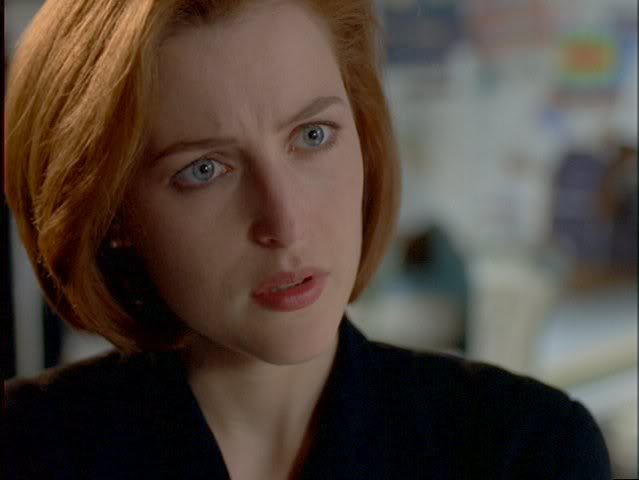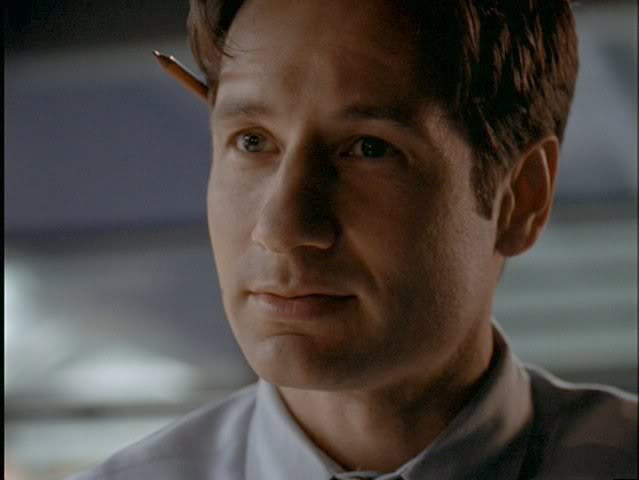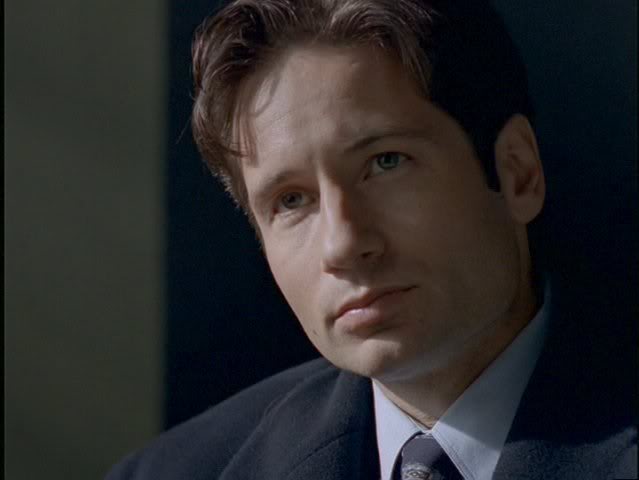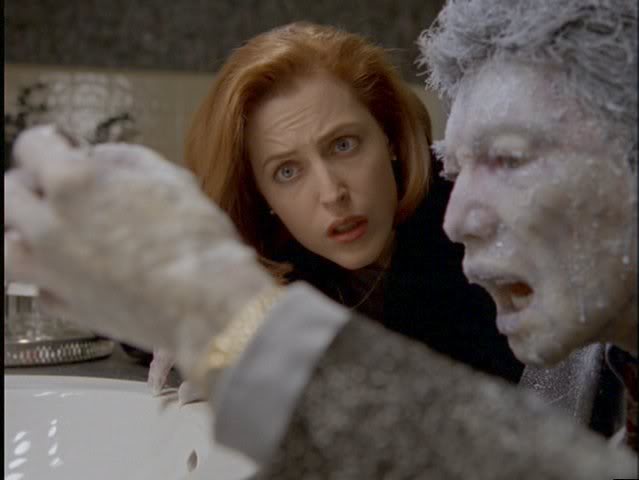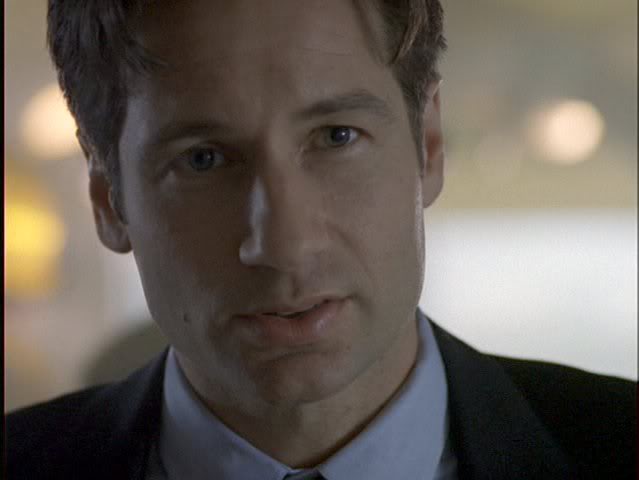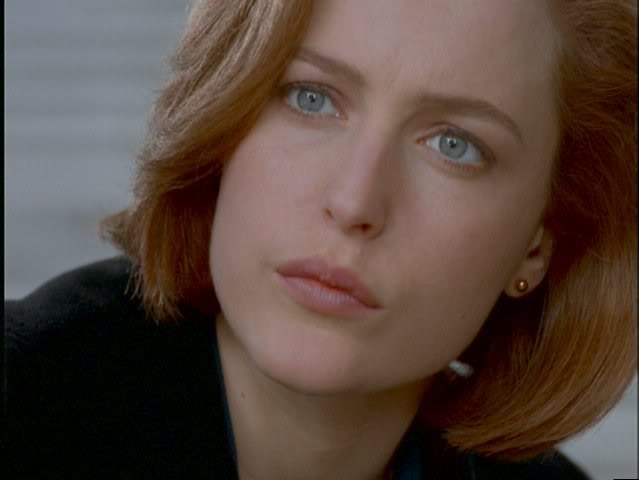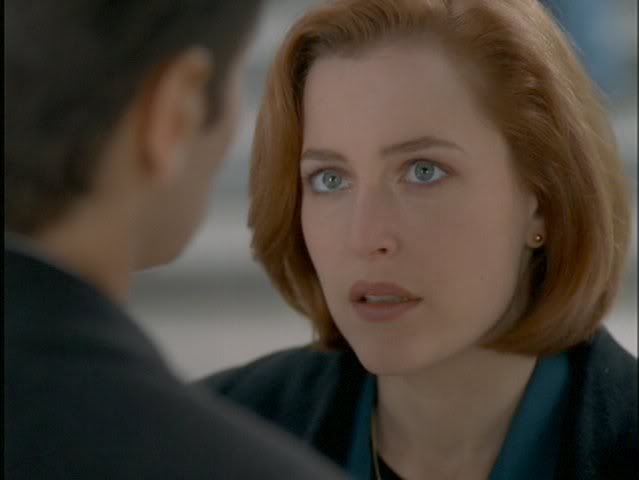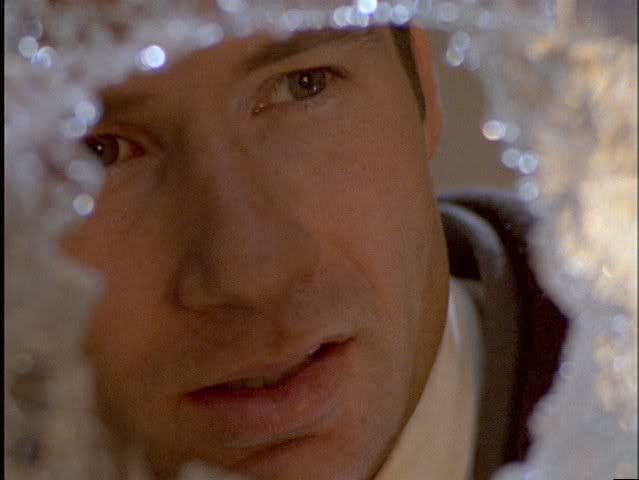REPOST - CTP Episode of the Day - 05.04.06 - Synchrony
Today's Cherished Episode: Synchrony (4x19)
Original Air Date: April 6, 1997
Written By: Howard Gordon & David Greenwalt
Directed By: James CharlestonFor centuries, scientists have debated whether time travel is possible -- and if it ever will be. For Mulder and Scully, this age-old conundrum is the key to solving several baffling murders.
"'Although common sense may rule out the possibility of time travel, the laws of quantum physics certainly do not.' In case you forgot, that's from your graduate thesis. You were a lot more open-minded when you were a youngster."
Some "Synchrony" Tidbits & Musings:
-- Title: "Synchrony" means simultaneous occurrence.
-- Some tongue-in-cheek advice from Howard Gordon to screenwriters everywhere: Avoid like the plague the twin topics of disgruntled Vietnam veterans and time travel. "They're the two great taboos," laughed Gordon, recalling the gyrations involved in turning out his next-to-last X-Files script.
-- Gordon coauthored this episode immediately after completing ("with much bloodletting, as usual") his work on "Unrequited." Chris Carter teamed him up for the task with David Greenwalt, a new co-executive producer (previous shows: Profitt and Buffy the Vampire Slayer) who spent several months on The X-Files beginning in the middle of the fourth season. (Interestingly, Greenwalt was previously offered a job as a writer on The X-Files but turned it down to work on Buffy.)
-- "David lived in Santa Barbara, and I lived in Los Angeles," said Gordon. "So one rainy weekend we met halfway, in Simi Valley, to come up with an idea for a script that was due two or three weeks hence. Well, we went to a lot of bookstores and I sat around in four different Starbucks, and I got to know David, who's a great guy, really well. But just about the only other thing we accomplished was realizing just how difficult it was to come up with a good X-Files idea."
-- Their wet weekend stretched into a damp four days. After a long detour working on an idea concerning a prisoner escaping from jail by switching bodies with a free man -- "it felt too much like other episodes I'd done," said Gordon -- the pair agreed to adjourn and meet again the next morning, each bringing three fresh ideas to the table. "In fact, I didn't have anything to bring to the table," admitted Gordon.
-- But the next morning, he came across an interesting article in Scientific American. The article, in the magazine's March 1994 issue, was titled, "The Quantum Physics of Time Travel." Written by two Oxford professors, it explained in mind-whirling detail how modern theory allows for the existence of "closed timelike curves": shortcuts in the space-time continuum that, if they do indeed exist, could someday enable us to flit back and forth between the present, the future, and the past. Old-fashioned physical theories, said the authors, prohibit individuals from time-traveling backward and altering history. The laws of quantum physics, however, do not.
-- He and his partner understood enough of all this, said Gordon, to finally get the wheels turning. "I remembered that anecdote about J. Robert Oppenheimer, after he'd led the Manhattan project, coming into Harry Truman's office and complaining about the dropping of the atomic bomb he and his team invented. Well, what if Oppenheimer could have gone back into the past and 'un-invented' it? That led to another question: What would happen if we did know our future? I mean, life itself is about the unknown, and about finding out what lies ahead of us. But if everyone -- or maybe just a few people -- knew what was going to happen, it would create a fresh set of horrors, and would have to be stopped."
-- Unfortunately, neither Gordon nor Greenwalt could figure out how to leapfrog ahead and take a look at their finished script. It took a week of fifteen-hour days -- plus some important input from story editor John Shiban, producer Frank Spotnitz, and consulting producer Ken Horton -- to get the pretzel-shaped story line working properly. Gordon spent the weekend before shooting began in Vancouver frantically rewriting two important characters -- one a Stephen Hawking-like wheelchair-bound scientist -- out of the episode. "Those characters were useless, and this really tightened up the story, but on late Sunday night -- the episode started on Tuesday -- I really considered calling up Bob Goodwin and saying 'That's it. I've had my fill. I give up.'" After that, it was a piece of cake.
-- In early interviews about The X-Files, Chris Carter vowed he would never do an episode about time travel, citing the difficulties in making such a story work.
-- The opening scenes of "Synchrony" mirror the movie Back to the Future, right down to the clock tower. And fans of the original classic Star Trek series cited similarities between this episode and one called "City on the Edge of Forever," where Kirk had to choose between the woman he loved and the future of the world, the same as Jason Nichols did in "Synchrony."
-- Vitrification is the process of making something into a glassy substance, especially through heat fusion.
-- For the Shippers: "Synchrony" featured Mulder and Scully in bed together!!!!! (Well, they both sat on it at the same time; it was technically true.)
-- Oopsie! In the shot of the 6th Precinct police station, a California state flag was shown flying out front. The episode took place in Massachusetts, at the Massachusetts Institute of Technology.
-- Oopsie! When Lisa got off the bus, the number of the bus was different than the one seen heading downtown, the bus that Lisa presumably was on.
-- The Vancouver Art Gallery filled in for the Boston Public Library (where Lisa confronted the old Jason, who was following her).
-- Best Scullyism: "And if your sister is your aunt and your mother marries your uncle, you'd be your own grandpa."
-- A good try at continuity, with Mulder quoting Scully's "graduate" thesis (see above), but in the "Pilot," he referred to it as Scully's "senior" thesis. (But it must have been quite memorable, since Mulder could quote it four years later.)
-- Bad Plot Device Moment: Mulder, the poster boy for cell phone usage, asked Young Jason (who he just bailed out of jail) to personally deliver a message to Scully, rather than just calling her on the phone, thereby enabling Young Jason to meet up with his older self. (Never mind the fact that at that point in the episode, Jason had never even met Scully.)
-- Too bad Mulder didn't think to use the fire extinguisher to put out the two people on fire at the end of the episode, instead of just using it to break the glass.
-- Scully's statement that she was 23 when she wrote her senior thesis in college throws off her timeline of college, med school, residency, FBI Academy, Quantico teaching assignment for two years, and X-Files assignment at 28. Her undergraduate degree in Physics should have been completed when she was 20 or 21 to allow at least 4 or 5 years for her medical training.
-- Actor Michael Fairman (Older Jason Nichols) was a veteran of film, stage, and television when he appeared on The X-Files, but he might have been most familiar to soap opera fans for his roles on Ryan's Hope and General Hospital. He also had recurring roles on Hill Street Blues, Cagney & Lacey, and L.A. Law. He recently made a guest appearance on Frank Spotnitz's short-lived Night Stalker.
-- Hiro Kanagawa (Dr. Yonechi) is the voice of Reed Richards/Mr. Fantastic in the cartoon version of The Fantastic Four (currently seen on the Cartoon Network).
-- Director Jim Charleston remembered happily that the scene where Dr. Yonechi (actually stunt coordinator Tony Morelli in a protective suit) burst into flames went perfectly. "From the time his body was lit until the time the guys rushed in with fire extinguishers was exactly twelve seconds -- no more, no less."
-- David Duchovny said, "I remember that we kept shooting makeup scenes, because obviously nobody could figure out whether the audience would understand what was going on. They would always be writing little one-page scenes where somebody would try to explain it."
-- This was the only X-Files episode that David Greenwalt wrote or co-wrote. He stayed with the show as co-executive producer through the end of the fourth season, then moved on to become the head writer and eventually co-executive producer of Angel. He would also go on to direct many episodes of that series. Most recently, he served as a writer and co-executive producer of the short-lived NBC series Kidnapped.
-- Howard Gordon wrote one more episode of The X-Files ("Zero Sum") before leaving at the end of the fourth season to work on Buffy the Vampire Slayer and Angel. Since 2001, Gordon has been a writer for and executive producer of 24.
-- Concluded Gordon: "I think 'Synchrony' all came out pretty well in the end. But when it was all over I vowed I would never touch another time travel idea again as long as I lived."
-- Once & Future Retreads: Hiro Kanagawa (Dr. Yonechi) also died a horrible death as Peter Tanaka in "Firewalker." Jonathan Walker (Chuck Lukerman) was Charlie Morris in "Born Again." Norman Armour (Coroner) was an ER Doctor in "Sanguinarium." Brent Chapman (Security Cop) was the Traffic Cop in "D.P.O." Terry Arrowsmith (Uniformed Cop) was one of the Air Force Men in "Jose Chung's From Outer Space." Aurelio Dinunzio (Detective) was Antonio in "Anasazi."
(Thanks to chrisnu for today's pics.)
Please share your first impressions, favorite (or cringe-worthy) moments, classic lines, favorite fanfic, nagging questions, repeated viewing observations, etc., as today we celebrate "Synchrony."
Polly
